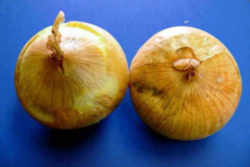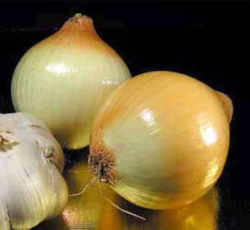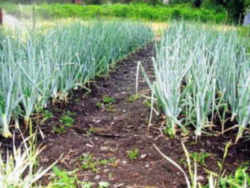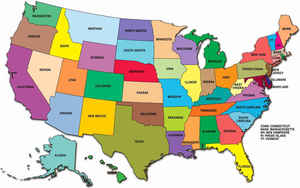Washington State Vegetable
Walla Walla Sweet Onion

Adopted on April 20, 2007
On April 20, 2007, Washington Governor Christine Gregoire signs House bill No. 1556 designating Walla Walla sweet onions the state's
official vegetable. Passed unanimously by the House and by a 42-3 vote in the Senate, the bill brings to fruition three years of student lobbying..
Washington State Vegetable:
Walla Walla Sweet Onion

Grown in Walla Walla County in southeastern Washington and a part of Umatilla County in northeastern Oregon. Seed originated in Italy, then was transplanted to the Mediterranean island of Corsica, where a French soldier, Peter Pieri, enamored of the onion's sweet taste and juicy flesh, carried some of the seeds with him to the Walla Walla Valley in the late 1800s. Pieri's fellow immigrants soon began raising the onions too, and established the Walla Walla Gardener's Association (a cooperative of local onion growers) in 1916.
Walla Walla sweet onions become Washington's official state vegetable on April 20, 2007.
HistoryLink.org Essay 8236
On April 20, 2007, Washington Governor Christine Gregoire signs House bill No. 1556 designating Walla Walla sweet onions the state's official vegetable.
Passed unanimously by the House and by a 42-3 vote in the Senate, the bill brings to fruition three years of student lobbying.
Teachers and students from Kirkland Junior High School and Eatonville Middle School who had lobbied for the bill, and farmers who grow Walla Walla
sweet onions, looked on as Governor Gregoire (b. 1947) signed the bill in Olympia.
Kirkland Junior High School teacher Toni Miller and her students first proposed Walla Walla sweet onion legislation late in the 2004 legislative session,
but the session ran out before both houses had approved the bill. They tried again in 2005 but the bill failed to pass both houses. During 2006 Kirkland
students emailed and wrote to legislators and testified during legislative hearings, but gained a nemesis: the Washington State Potato Commission.
Food Fight
Potatoes are Washington's top-grossing vegetable. The Washington State Potato Commission is an educational and lobbying organization that
serves the potato growers of Washington state. Potato Commission chairman Randy Mullen told The Seattle Times, "I don't have anything against
the Walla Walla sweet onion, but if you ask me, it's a county onion, not a state onion" (February 15, 2006).
During the 2006 legislative session a Senate committee passed a so-called "bulb and tuber" amendment honoring both potatoes and Walla Walla
sweet onions as state vegetables, but the bill died for lack of a vote. Local newspapers, quick to find humor in the sparring vegetables saga, harvested
puns by the bushel. One story in The Seattle Times, under the headline "Veggie Rapprochement," began: "A year ago, the Washington Potato
Commission tried to make hash of an endearing legislative proposal by Kirkland Junior High students ..." The bulb-tuber bill, the article continued, "never
gained traction ... but all that disappointment has been plowed under" (February 4, 2007).
At the beginning of the 2007 legislative session, a group of legislators led by Representatives Maurine Walsh, R-Walla Walla and Bill Grant, D-Walla
Walla reintroduced the onion bill. The Potato Commission agreed not to stand in the way of the bill's passage. "Our onions may not be as prolific
as our potatoes, but they are unique," Senator Marilyn Rasmussen, D-Eatonville, told the Seattle Post Intelligencer (April 6, 2007). Senator Walsh
told a House committee, "Frankly, onions and potatoes are a lovely combination" (The Seattle Times, February 4, 2007). Kirkland Junior High
School teacher Toni Miller had retired in 2006. Eatonville Middle School teacher Alex Hansen and his students stepped in to lobby for the bill.
How Sweet They Are
Peter Pieri brought sweet onion seed from the island of Corsica off the west coast of Italy to Walla Walla in the late 1880s. Using selective
cultivation over time Pieri and his neighboring farmers developed the larger, sweeter, rounder onion that became known as the Walla Walla Sweet. These
onions were first harvested in the Walla Walla valley in 1900.
The onions are 95 percent water and must be harvested by hand. Their low percentage of pyruvic acid (the chemical that makes onions pungent) distinguishes
Walla Walla sweets from their tear-inducing kin. Walla Walla sweets are grown in Washington and Oregon, harvested from early June through August, command
a higher price than most other onions, and are shipped throughout the United States and Canada.
On May 24, 1995 the United States Department of Agriculture issued Marketing Order 956 designating Walla Walla sweets as a unique variety of onion
and establishing an official growing region. Only onions grown within the specified area (the Walla Walla valley of Southeast Washington and Northeast
Oregon) can legally be marketed as Walla Walla sweet onions.
Washington My Home, Onion My Vegetable
Walla Walla sweet onions joined an elite list of Washington's state symbols, including the Western hemlock, willow goldfinch, coast rhododendron,
steelhead trout, apple, Columbian mammoth, bluebunch wheatgrass, orca whale, green darner dragonfly, and the songs "Roll On, Columbia, Roll On"
and "Washington, My Home."
Georgia, Texas, and Utah have also
designated sweet onions as their official state vegetables.
By Paula Becker, August 02, 2007
Washington House Bill No. HB 1556
Washington HOUSE BILL REPORT
HB 1556
As Passed Legislature
Title: An act relating to designating the Walla Walla sweet onion as the official Washington state vegetable.
Brief Description: Designating the Walla Walla sweet onion as the official Washington state vegetable.
Sponsors: By Representatives Walsh, Grant, Haler, Sells, Springer, O'Brien, Seaquist, Ahern, Takko, Williams, Ericks, Roberts, Strow, Linville, Ormsby
and McDermott.
Brief History:
Committee Activity:
State Government & Tribal Affairs: 1/30/07 [DP].
Floor Activity:
Passed House: 2/14/07, 95-0.
Passed Senate: 4/5/07, 42-3.
Passed Legislature.
Brief Summary of Bill
• Designates the Walla Walla Sweet onion as the state vegetable.
HOUSE COMMITTEE ON STATE GOVERNMENT & TRIBAL AFFAIRS
Majority Report: Do pass. Signed by 9 members: Representatives Hunt, Chair; Appleton,Vice Chair; Chandler, Ranking Minority Member; Armstrong, Assistant
Ranking MinorityMember; Green, Kretz, McDermott, Miloscia and Ormsby.
Staff: Colleen Kerr (786-7168).
Background: The Walla Walla Sweet onion is grown in Walla Walla County, but finds its origins on the island of Corsica. Over a century ago, a retired
French soldier named Peter Pieri found a sweet onion seed there and brought it to the Walla Walla Valley. The sweet onion had impressive winter hardiness
well-suited for the climate of southeastern Washington. Soon This analysis was prepared by non-partisan legislative staff for the use of legislative
members in their deliberations. This analysis is not a part of the legislation nor does it constitute a statement of legislative intent.
Pieri and many Italian immigrants in the area began harvesting the seed. Over several generations of careful hand selection, the sweet onion developed
greater sweetness, size, and shape. Today, there are approximately 40 growers producing Walla Walla Sweet onions on 1,200 acres of farmland in the
Walla Walla Valley. Sweet onion season is mid-June through September and, since 1984, Walla Walla has celebrated the Sweet Onion Festival every July.
Onions have been a food source for at least 5,000 years. There are ancient Chinese,Sumerian, Mesopotamian, and Egyptian references to the cultivation
of onions. The onion
was also an essential part of the Ancient Roman and Greek diet. In more recent times, the onion has been an essential part of classical French cooking
in the bourgeoise, nivernaise, and soubise sauces. Today the onion crop is a $400 million crop in the United States. Other sweet onion varieties are
the: Texas Yellow Bermuda, White Bermuda, and Crystal Wax; the Vidalia Sweet from Georgia; Hawaii's Maui Sweet; and the Nevada Sweetie Sweet.
Summary of Bill:
Designates the Walla Walla Sweet onion as the official state vegetable.
Appropriation: None.
Fiscal Note: Not requested.
Effective Date: The bill takes effect 90 days after adjournment of session in which bill is passed.
Staff Summary of Public Testimony:
(In support) The Walla Walla Sweet is from Walla Walla and only from Walla Walla. Indeed, this sweet onion is only grown properly in the Walla Walla
Valley. Because of that it deserves the notoriety of being designated the state vegetable. Last year there was some resistance from the potato community,
but this year they have gotten behind the bill and are giving the Walla Walla Sweet their full support. This bill will also give a shot in the arm
to the Walla Walla Sweet onion farmers who have fallen on tough times. Designating the Walla Walla Sweet as the state vegetable will assist in marketing
this gourmet delicacy across the nation.
(Opposed) None.
Persons Testifying: Representative Walsh, prime sponsor.
Persons Signed In To Testify But Not Testifying: None.
Washington Law
The law designating the Walla Walla sweet onion as the official Washington state vegetable is found in the Revised Code of Washington, Title 1, Chapter 1.20, Section 1.20.140.
Title 1 GENERAL PROVISIONS
Chapter 1.20 General provisions.
1.20.140 State vegetable.
RCW 1.20.140
State vegetable.
The Walla Walla sweet onion is designated as the official vegetable of the state of Washington.
[2007 c 137 § 1.]

List Official US State Foods







